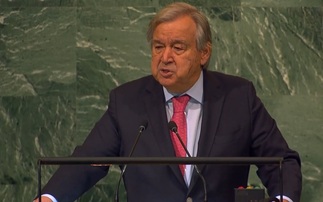Researchers say complex nature of reports could be hampering climate negotiations
The summaries designed to condense the latest scientific thinking on climate change to make it accessible for policymakers are too difficult to read, a new study has warned.
A paper, published today in Nature Climate Change, analysed the 'readability' of the influential summaries from the Intergovernmental Panel on Climate Change (IPCC) which have been published for the past 25 years.
The researchers found the reports are even more difficult to read than a scientific journal, despite them being aimed at policymakers who often have no background in scientific training.
"Global action on climate change might be seriously hampered because policymakers would need the equivalent of a PhD in the subject to begin to make full sense of the IPCC reports," said Ralf Barkemeyer, associate professor at KEDGE Business School in Marseille, who led the study.
The IPCC releases its assessment reports roughly every five years, with the last series published in 2014. While the full reports can run into the thousands of pages, the IPCC also includes a 20 to 30 page summary alongside each report, which condenses the key details of the report for a wider audience of political and business leaders.
The latest study assessed the readability of the briefing papers and compared them with how the IPCC's findings were presented in the popular media. It found that while the readability of the summaries has remained relatively constant over time, coverage by 'quality newspapers' has become more readable, but also increasingly pessimistic about climate change and climate science - sometimes even more so than the IPCC reports themselves.
"IPCC summaries are so difficult to understand that they can give rise to many different interpretations on the same point," said Professor Barkemeyer. "They can easily be misinterpreted by climate change sceptics, for example. If these summaries were simpler and more accessible, the public could benefit directly from these documents and discover the true nature of the challenges we face."
An IPCC spokesman told BusinessGreen the body is taking steps to improve the accessibility and readability of the reports.
"There is no doubt that more needs to be done to make IPCC reports more readable and accessible," he said. "The newly elected Chair of the IPCC, Hoesung Lee, has made this point and we are determined to tackle this. The challenge is to do it in a way that does not damage the scientific rigour and robustness of the reports, or allow important nuances in them to be lost.
"The previous Session of the IPCC, in Nairobi in February this year, took decisions to enhance the usability of IPCC reports, for instance by using digital technology to share and disseminate information, and to draw on specialists (such as science writers and graphical designers) to enhance the readability of IPCC reports. It's worth noting that even in the Fifth Assessment, progress on enhancing communications was made, such as using headline statements as a two-page summary of the Summary for Policymakers, and the production of scientifically robust videos about the reports."
Professor Frank Figge, who heads the group at KEDGE BS which conducted the research, said the new study suggests the problem of poor readability is particularly acute in the summaries on climate mitigation and adaptation measures, potentially because they are more political and contentious than the physical basis reports.
"Mitigation, adaptation - so what do we need to do, what are the threats, do we need to reduce CO2 emissions, who needs to reduce CO2 emissions, by how much - that is of course quite a contentious issue," he said. "What [the researchers] find is that the document that goes into negotiations... is easier to read than the one that comes out.
"What you probably see is that because it's such a political issue, they are really fighting for how should this be phrased, should it be phrased that way, and that makes it very very difficult in the end."
In an interview with BusinessGreen last year, then IPCC-chairman Dr Rajendra Pachauri said that while the authors have the final say in what goes into the report, the input of governments helps with the readability.
"Governments are very good at telling us how to express a scientific fact in a way that a policymaker would understand and that's where the interaction with governments is particularly valuable with the quality of the report and readability for business leaders, politics and everyone," he said.







